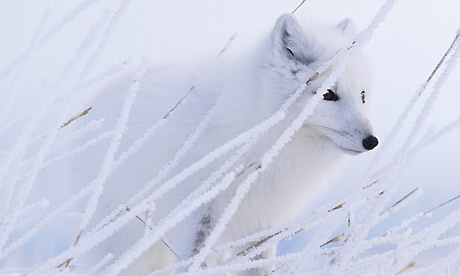
Out in the cold ... an Arctic fox blends into the snow. Photograph: Getty
Polar bears may not be the only Arctic wildlife threatened by global warming. Scientists have discovered that Arctic foxes also struggle as the ice disappears because they rely on the frozen seas to survive the bleak winters.
Researchers tracked the movements of 14 young foxes as they faced their first Arctic winter in northern Alaska, where the temperature plunges to -30C and it is dark for 24 hours a day. Only three animals survived the winter, by wandering hundreds of miles across the frozen sea ice looking for seal carcasses left by polar bears. The 11 foxes that remained on the mainland perished.
The scientists said taking to the ice could help foxes survive because there were fewer predators and food was easier to find than on land. But they said the discovery raised new concerns over the foxes' survival in the face of diminishing Arctic ice cover. Sea ice in the Arctic region, formed from frozen seawater, has shrunk dramatically in recent years and could reach a new record low this summer.
Experts said this week that this year's ice melt season has started sooner than usual.
Nathan Pamperin, a scientist at the department of biology and wildlife at the University of Alaska Fairbanks, who led the Arctic fox study, said: "With reduced access to sea ice, it is possible that, in the years when foxes would normally travel on the ice, they may face tougher conditions on land, and possibly lower survival."
He said it was known that Arctic foxes use sea ice - polar explorers have reported tracks close to the north pole - but that the team did not expect to see the animals spend so long on the ice so far from the coast.
The three foxes using the sea ice to survive the winter spent up to five months there, travelling up to 1,700 miles.
Pamperin said: "More research needs to be done to really understand how important the ice is from year to year."
Publishing the study in the journal Polar Biology, the researchers said: "Concerns about the effects of diminishing Arctic ice extent to polar bear populations have received much attention recently ... If future populations of Arctic foxes lose access to sea ice, the primary negative effects would likely be reduced winter survival and reproduction."
The fox is not as threatened as the polar bear, they said, because the fox could switch to foraging on land more easily. This could drive them into human settlements, "increasing the potential for human-wildlife conflicts".

1 comment:
Good article.
I hadn't thought about any animals other than the polar bear being at risk in the Arctic. I wonder how many more are at risk that we haven't heard of?
Post a Comment